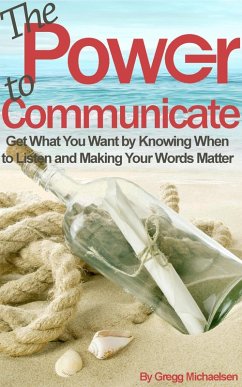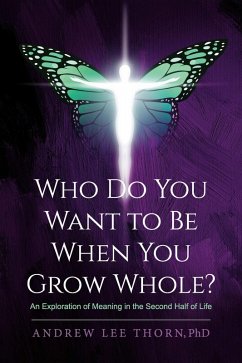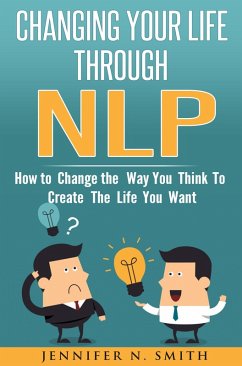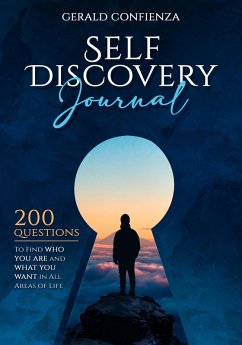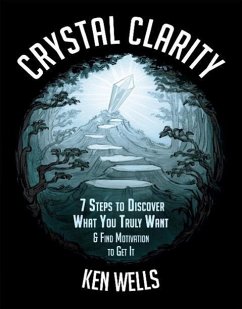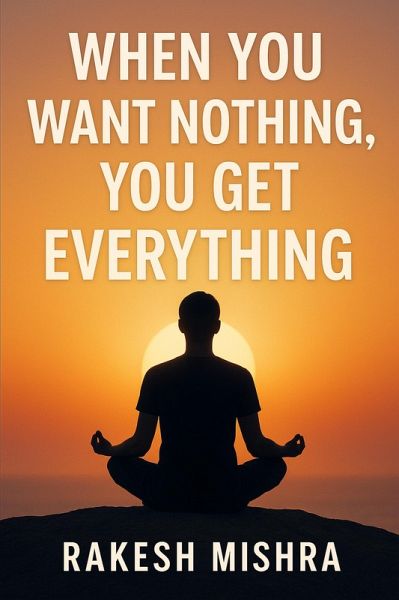
When You Want Nothing : You Get Everything (eBook, ePUB)

PAYBACK Punkte
0 °P sammeln!
In the frenetic pulse of 2025, where 46 notifications ping our devices daily, 7 hours and 4 minutes are spent on screens, and 121 emails flood inboxes, per a 2024 digital report, we are caught in a relentless cycle of wanting. Desire-for success, recognition, connection, or the next social media hit-drives much of human behavior, yet it often leaves us unfulfilled, restless, and disconnected. The central thesis of When You Want Nothing, You Get Everything is a paradox: by letting go of unchecked desire, we unlock a life of clarity, purpose, and abundance. This section explores the nature of th...
In the frenetic pulse of 2025, where 46 notifications ping our devices daily, 7 hours and 4 minutes are spent on screens, and 121 emails flood inboxes, per a 2024 digital report, we are caught in a relentless cycle of wanting. Desire-for success, recognition, connection, or the next social media hit-drives much of human behavior, yet it often leaves us unfulfilled, restless, and disconnected. The central thesis of When You Want Nothing, You Get Everything is a paradox: by letting go of unchecked desire, we unlock a life of clarity, purpose, and abundance. This section explores the nature of this paradox, why desire can trap us, and how releasing its grip paves the way for true fulfillment in the hyperconnected world.
The Nature of Desire
Desire is a fundamental human impulse, rooted in our biology and psychology. It propels us toward survival-food, shelter, connection-but in the modern era, it has been hijacked by a digital epidemic. The dopamine loop, triggered by likes on Instagram or Slack pings, keeps us chasing fleeting rewards. A 2024 neuroscientific study found that notifications increase dopamine levels by 15%, reinforcing compulsive behaviors like 150 daily phone checks, per a 2024 survey. This creates an attention crisis, with our focus shrinking to an 8-second attention span, per a 2025 report, as we crave instant gratification over lasting fulfillment.
Yet, desire is not inherently negative. It fuels ambition, creativity, and growth. The paradox lies in its unchecked form: when desire becomes a master rather than a servant, it leads to dissatisfaction. A 2023 psychological study found that 70% of social media users feel inadequate after scrolling, driven by FOMO (fear of missing out) affecting 67% of users, per a 2024 survey. This relentless wanting-new gadgets, better jobs, more followers-creates a cycle of comparison and restlessness, leaving us empty despite material gains.
The Trap of Unchecked Desire
Unchecked desire traps us in several ways. First, it fragments our attention. The digital rush-with 47% increased engagement from infinite scroll on TikTok, per a 2024 study-pulls us away from meaningful goals. A 2023 study showed that multitasking driven by digital distractions reduces productivity by 40%, as we chase notifications instead of purpose. Second, it fuels stress and anxiety. The pressure to keep up, with 62% of employees expected to respond after hours, per a 2023 survey, spikes amygdala activity by 20%, per a 2024 neuroimaging study, keeping us in a state of hyperarousal.
Third, unchecked desire erodes relationships. Phubbing (phone snubbing) affects 30% of relationships, and 40% of parents are distracted during family time, per a 2024 survey, leading to 45% of children feeling neglected. This disconnect stems from wanting external validation-likes, retweets-over genuine connection. Finally, it creates a paradox of scarcity: the more we want, the less satisfied we feel. A 2024 wellness study found that 60% of adults pursuing material desires report lower life satisfaction, despite achieving their wants.
The Nature of Desire
Desire is a fundamental human impulse, rooted in our biology and psychology. It propels us toward survival-food, shelter, connection-but in the modern era, it has been hijacked by a digital epidemic. The dopamine loop, triggered by likes on Instagram or Slack pings, keeps us chasing fleeting rewards. A 2024 neuroscientific study found that notifications increase dopamine levels by 15%, reinforcing compulsive behaviors like 150 daily phone checks, per a 2024 survey. This creates an attention crisis, with our focus shrinking to an 8-second attention span, per a 2025 report, as we crave instant gratification over lasting fulfillment.
Yet, desire is not inherently negative. It fuels ambition, creativity, and growth. The paradox lies in its unchecked form: when desire becomes a master rather than a servant, it leads to dissatisfaction. A 2023 psychological study found that 70% of social media users feel inadequate after scrolling, driven by FOMO (fear of missing out) affecting 67% of users, per a 2024 survey. This relentless wanting-new gadgets, better jobs, more followers-creates a cycle of comparison and restlessness, leaving us empty despite material gains.
The Trap of Unchecked Desire
Unchecked desire traps us in several ways. First, it fragments our attention. The digital rush-with 47% increased engagement from infinite scroll on TikTok, per a 2024 study-pulls us away from meaningful goals. A 2023 study showed that multitasking driven by digital distractions reduces productivity by 40%, as we chase notifications instead of purpose. Second, it fuels stress and anxiety. The pressure to keep up, with 62% of employees expected to respond after hours, per a 2023 survey, spikes amygdala activity by 20%, per a 2024 neuroimaging study, keeping us in a state of hyperarousal.
Third, unchecked desire erodes relationships. Phubbing (phone snubbing) affects 30% of relationships, and 40% of parents are distracted during family time, per a 2024 survey, leading to 45% of children feeling neglected. This disconnect stems from wanting external validation-likes, retweets-over genuine connection. Finally, it creates a paradox of scarcity: the more we want, the less satisfied we feel. A 2024 wellness study found that 60% of adults pursuing material desires report lower life satisfaction, despite achieving their wants.
Dieser Download kann aus rechtlichen Gründen nur mit Rechnungsadresse in A, B, CY, CZ, D, DK, EW, E, FIN, F, GR, H, IRL, I, LT, L, LR, M, NL, PL, P, R, S, SLO, SK ausgeliefert werden.




